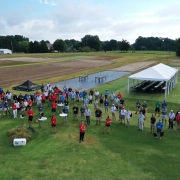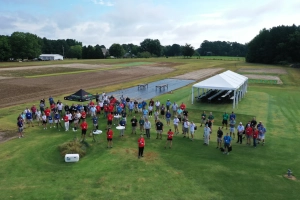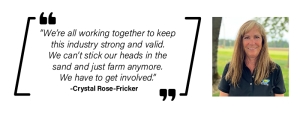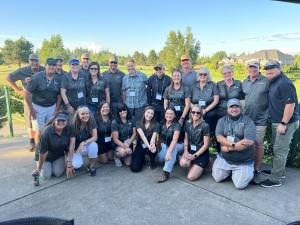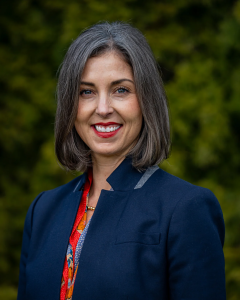Pure Seed Cultivates Varieties for the World
Developing new grass seed varieties is no easy feat for Crystal Rose-Fricker and her team at Pure Seed. The process usually takes a decade or longer of careful breeding, cultivating the right mix of genetic traits that can withstand drought, diseases, and other environmental pressures while also maximizing yield for growers.
“Breeding is always a numbers game,” Rose-Fricker said. “For every variety that we license, we probably throw away at least 10 because they’re not good enough.”
It is that level of detail that has established Pure Seed as a top player in the seed industry. The company’s products can be found all over the world, from the lawn and garden section at Lowe’s Home Improvement stores to major sporting events like the 2022 FIFA World Cup in Qatar and the 2023 Ryder Cup at Marco Simone Golf and Country Club in Rome.
A family business
Pure Seed was founded by Rose-Fricker’s father, Bill Rose, in 1972 as a marketing and wholesale supplier of warm- and cool-season turfgrass and forages. Two years later, Rose started Pure Seed Testing to cultivate new varieties at its 175-acre research farm in Canby, and a second 25-acre research farm in Rolesville, N.C. Pure Seed Testing will celebrate its 50th anniversary in June.
Rose-Fricker is now president of Pure Seed and Pure Seed Testing, carrying on the family business. The companies employ about 80 people depending on the season, she said, including her own kids, McKayla Fricker-Smucker and Austin Fricker.
“Between our companies, we’re almost 50% women, which is unusual for an agricultural company,” Rose-Fricker said.
Strengthening the industry
Being part of the Oregon Seed Association gives members the chance to come together and strengthen their industry, Rose-Fricker said. Even though they are technically competitors, she said they are stronger as a group when it comes to advocating for legislation and support that helps everyone along the supply chain.
“We’re all working together to keep this industry strong and valid,” she said. “We can’t stick our heads in the sand and just farm anymore. We have to get involved.”
That means making sure they tell the industry’s story, and explaining how companies like Pure Seed are cultivating better seed varieties that give all the benefits of natural grass while being more environmentally friendly — requiring less water and chemical inputs.
“People want to have a beautiful green landscape, but they don’t want to feel guilty about it,” Rose-Fricker said.
The next generation
Pure Seed also volunteers with Oregon Aglink’s Adopt-A-Farmer program, which pairs farmers with middle school classrooms for field trips and agricultural-themed lessons. This year, Rose-Fricker said the farm in Canby will welcome 200 kids from Sellwood Middle School in Portland.
For some kids, it might be the first time they’ve ever been on a farm or seen a tractor, Rose-Fricker said. The program aims to show them that they could consider jobs in agriculture, no matter what they’re interested in doing.
“It’s really needed to give kids that experience,” she said. “Who knows what they’ll end up being in the future?”

